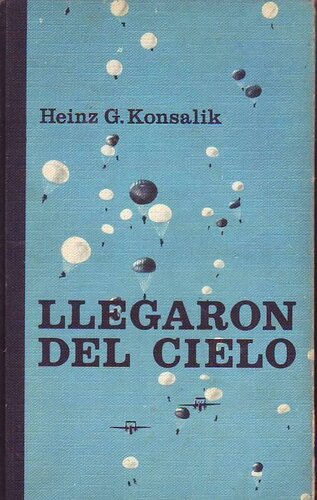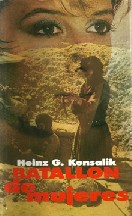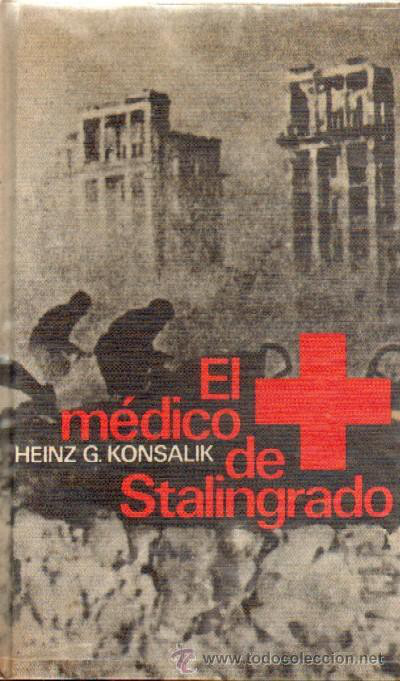oleebook.com
El medico de Stalingrado de Konsalik, Heinz G
de Konsalik, Heinz G - Género: Ficcion
Sinopsis
Konsalik, Heinz G Year: 2010
Libros Recomendados - Relacionados
Reseñas Varias sobre este libro
This book only earned it's additional second star because the idea in it really isn't bad. The writing is okay, as well. But what is most striking about this novel are the ridiculously bad, if not stupidly written characters. Konsalik clearly writes characters a way he'd them, and he s nymphomanic women, and many of them. In fact, there is not one female character in his novel who isn't nymphomanic, and of course the poor male characters aren't to be blamed that they have to lust for them?
But also the male characters rarely get beyond being sterotypical figures in something that at times feels a cardboardtheatre in Konsalik's writing, which unfortunately never grows beyond being a better dime novel.
If it weren't for the interesting plot behind it and an okay pace of writing, this would've gotten one star from me.11 s narodni_heroj15
Ein schreckliches Buch, dem ich null Sterne geben würde, wenn es möglich wäre... Wie der Autor eine vermutlich erfolgreiche Karriere als Schriftsteller machen konnte, werde ich nie begreifen. Er ist xenophob, russenfeindlich ("die alte russische Unterwürfigkeit brach durch") und extrem rassistisch gegenüber Asiaten.
Oberarzt der Stalingrader Klinik: "Er (Prof. Pawlowitsch) sieht die Falle nicht, dachte er glücklich. Nur so war es möglich, den deutschen Arzt herbeizuholen, zu helfen. Nur durch eine Gemeinheit, er ist ein Tatar, ein gelber Affe!"
"Sein (Prof. Pawlowitsch) asiatisches Gesicht war verzerrt. Er sah jetzt wirklich aus wie ein alter, wütender Affe. (...) in seinem breiten Gesicht standen schräg, eng wie Schlitze, die Augen.
Die sowjetischen Ärzte scheinen gierig nach unethischen Menschenversuchen zu sein, was ich wesentlich ironisch finde...
Prof. Pawlowitsch: "Ich muss an ihm (Sellnow) studieren und ihm noch einmal den Schädel öffnen, um zu sehen, was in ihm vorging!"
Oberarzt: "Wenn er gestorben ist, dieser Sellnow, rufen Sie uns sofort, Schwester. Er kommt dann gleich in die Anatomie. Der Chef fiebert darauf, ihn zu sezieren..."
Alle Russen haben keine Illusionen mehr über die UdSSR und den Kommunismus, obwohl es erst 1949 ist, und ihr Land nur vier Jahre zuvor vielleicht den größten Sieg in menschlicher Geschichte erreicht hat. OK, das kann ich verstehen, das Leben in Russland war nie ein Paradies. Die russischen Ärzte und Offiziere scheinen aber ihr Volk und ihr Land buchstäblich zu hassen:
Dr. Böhler: "Wir sollen wirklich Deutschland wiedersehen?"
Dr. Kresin: "Ja! Und dann geht ihr weg, ihr alle, und wir leben hier weiter in dem Mist, haben keinen, mit dem man vernünftig sprechen kann - wir bleiben bei Mütterchen Russland und verfaulten, weggeworfenen Kohle!"
Die russischen Ärzte sind totale Amateure, alle deutschen Ärzte sind Genies. Alle russische Frauen sind buchstäbliche Nymphomaninnen und sind absolut notgeil ausschließlich nach den deutschen Ärzten. Usw. Usw.
Das Buch habe ich nur gelesen, weil es günstig war und wollte meine Sprachkenntnisse verbessern. Dabei hat es auch geholfen. Ich würde es aber niemandem empfehlen... gelesen1 Marco Antonio111 2
He leído bastante sobre historias de cautiverio y campos de concentración, El médico de Stalingrado contrasta con la mayoría de ellas.
A diferencia de lo común que sería la brutalidad, los malos tratos y la miseria entre otras cosas que suelen ser el eje central de estos campos, esta historia está basada más que nada en las emociones, las convicciones, la camaradería y las relaciones que se dan entre un grupo de médicos y sus captores.
Hay mucha emotividad, relaciones amorosas algo enfermizas, lo que puede resultar un tanto inverosímil, pero la forma que el autor hace uso de este argumento le convierte en un acierto.
Este título aborda principalmente el lado humano de sus protagonistas, obviamente sin dejar de lado las penurias que conllevan al ser prisioneros alemanes en un campo de trabajo soviético. Ambos elementos acompañados de una excelente ambientación y la fluidez de su narrativa le dan vida a una gran novela.
Heinz G. Konsalik gran escritor alemán de literatura bélica y post-guerra.
4.7?1 Gabriele GoldstoneAuthor 6 books41
I read this book because of its setting and because it was in my father's book collection, which I inherited. It was easy for me to read, in spite of my rusty German language skills, and the book's 1956 publishing date. However, it's also filled with offensive racism and treats female characters either sexual animals or holy saints. The novel reflects the author's views as a former Hitler Youth and Gestapo member and wouldn't be publishable today. Still, it does offer some insight into the German prisoner of war situation in the Soviet Union and that's why I read it. Konsalik's views are no longer acceptable ... at least not in the west ... and for that I'm grateful.1 ?Miriam?427 19
3,5??1 Emma597 12
Das Buch spielt sich in einem sowjetischen Kriegsgefangenen Lager ab und begleitet den deutschen Arzt Dr. Böhler während der Zeit nach dem 2. Weltkrieg. Der Autor hat seine Informationen aus Berichten von entlassenen Gefangenen.
Ich bin froh dieses Buch zur Hand genommen zu haben, es war wirklich interessant und gleichzeitig erschreckend über die Zustände in solch einem Lager zu lesen. Bei den medizinischen Eingriffen habe ich sehr mitgefiebert, die anfangs ohne richtiges Equipment trotzdem gelangen. Das Buch hat mich auch emotional sehr bewegt, die Entwicklung der Beziehung zwischen den sowjetischen Offizieren und Ärzten zu den deutschen Ärzten war einfach großartig. Der innere Zwiespalt zwischen Sympathie und Menschlichkeit und den Hass auf die Deutschen.
Es gab zwei Liebesgeschichten in dem Buch; die eine fand ich sehr glaubwürdig und die andere hingegen gar nicht.
Die Charaktere haben mich alle abgeholt, besonders Dr. Böhler, der für sein Verantwortungsbewusstsein gegenüber seinen Patienten sich selbst hinten anstellt. Dr. Sellnow, der seine Ecken und Kanten hat aber loyal gegenüber seinen Freunden ist und der sowjetische Offizier Worotilow. Dieser wächst menschlich gesehen über sich hinaus und überwindet seine Prinzipien.
Hier und da gab es Kleinigkeiten, die mich gestört haben, aber die sind nicht der rede wert.
Ein grandioses Buch, ich kann es nur jedem empfehlen! 2 s Robert Colquhoun172 1 follower
A fairly dry read but interesting nonetheless. Certainly a different perspective from what we in The West are used to reading about and thinking about with respect to the Germans from WWII.1 Ra251 26
In all okay read about German doctors in a Russian concentration camp. This is my second Konsalik book and I agree with other commentators that Konsalik seems to write women characters especially badly. The men are a bit more interesting but they still lack development. I see this is in many post-war literature, and adventure genres where the story is action-driven.
The plot and pacing are both good, and the little vignettes of life and relationship in prison environment are also inetersting, including Stockholm syndrome and the softening of the captors towards the captives. There are few human interactions there, but on the whole just passable reading to improve my German comprehension. ebook german David Sanchez61
4.3 ? me gusto, tiene una historia que te enrolla en un campamento ruso. La forma en que se relacionan los Plennis (prisioneros alemanes) y todo el personal ruso es increíble, porque empiezan con un mando jerárquico y distante, pero el tiempo y el lugar hace que compartan experiencias y se vuelvan queridos, para que al final entre rusos y alemanes se traten como hermanos.
Me gusta la forma en que el libro abarca temas médicos y la preponderancia que se le da al personal de salud en la guerra (directamente proporcional a la que debería tener en los tiempos de paz) Sebastian Sandino50
El médico de Stalingrado, es una obra clásica de literatura del siglo XX, con grandes dosis de hermandad, amor, pasión, celos, nostalgia y grandes operaciones médicas, además de una descripción detallada de las emociones del cautiverio en la heladas estepas rusas. Lo único que ma faltó fue un capitulo más extenso del final. Sarah Bauer122 2
Actual rating: 2.5 Heidi de Goede468 5
My eerste Konsalik was bietjie teleurstellend. Rhona Crawford421 4
Another favourite from my high school years. I loved Konzalik! JamesAuthor 29 books7
You should never judge a book by its cover!
On the version of The Naked Earth I read, the cover art made it look a story set in a Nazi concentration camp, wherein the female prisoners are subjected to all sorts of medical experiments mostly of a sexual nature. The art depicted a girl disrobing, while a doctor and the Nazi officer leered at her. The girl is in for a rough old time, and was about to be subjugated to horrors that we readers could not possibly even imagine. You can plainly see why I was drawn to reading material such as this sorry it's a character flaw.
But as I said above, you can't judge a book by its cover. The swastika covered The Naked Earth, is in fact an English translation of a German book called Der Arzt von Stalingrad(1956) the Doctor of Stalingrad, and it is really the story of German prisoners in Stalingrad P.O.W. camp, and the medical team who strive in harsh conditions, with little or no equipment, to treat his patients in a humane way. It is a German equivalent of Weary Dunlop's story (Australian readers will know to whom I am referring).
So here's the blurb from inside the book:
The grim and horrifying background of this book is the giant prisoner-of-war camp at Stalingrad, with it thousands of German prisoners. It is the tragic story of a band of medical men who, in the icy winters and under primitive conditions, with insufficient instruments, cut off from all medical supplies, almost starving, without hope for themselves, knew only one duty to help others.
Many people have co-operated on this work, including former German prisoners of war whose experiences the author has collected during years of research to produce this book, written in the terse, hard, and realistic language the subject demands.
As you have read, the cover, and the actual story content do not match at all, and I am sure that those who bought the book seeking slightly perverted lascivious thrills were sadly disappointed. Instead they got a piece of reasonable literature, that told a war story from the perspective of the other side. Natxo Cruz608
Novel·la històrica ambientada en un campament de presoners alemanys a Stalingrad. D'una banda, té l'interés que suscita la història dels perdedors de la guerra - la sort dels quals ha estat deliberadament ignorada en tant que culpables - en qualsevol de les seves formes; en aquest cas, les vicissituds d'un grup de soldats capturats a Stalingrad el 1943 fins el seu alliberament vuit anys més tard i les seves relacions amb els seus captors russos.
De l'altra banda, la qualitat literària és simplement acceptable, els personatges són massa romàntics i els tòpics surten de tot arreu on es grata una mica.
Il·lustra però no convenç. Sergio1,118 78
Un autore bravissimo che riesce in questo libro a disegnare la figura di un medico al di sopra dell'odio, delle parti, delle bassezze umane, un uomo che attraverso la sua professione e il suo cuore d'oro riesce ad insegnare la fratellanza e l'amore per la vita anche in un gulag sovietico dove i tedeschi sono prigionieri senza molte speranze di ritornare a riabbracciare la loro patria. E.J. Matze133 6 Want to read
aboy his experiences in Russia
...wrote 155 novels and sold 83million books...
"Liebesnacht in der taiga"(1960)
"Frauenbattallion"(1981)
(aged 78)snoecks-2001 Richard Boyer25 13
very goood Mariana163 27
Nothing to say, my heart is broken Motormuis39 1 follower
Autor del comentario:
=================================





